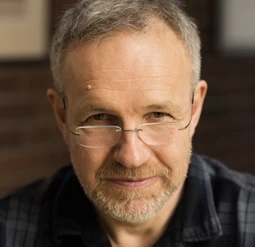“We are trying to understand the brain”
The Max Planck Institute (MPI) of Neurobiology in Martinsried investigates the brain and nervous system: how they are structured, how and what causes changes and how they work.
July 2018

© Max-Planck-Institut für Neurobiologie
The MPI of Neurobiology is one of 84 research institutes currently run by the Max Planck Society. Since 1984 it has been located in Martinsried, and since 1998 it has been independent. Previously, it was an external part of the MPI of Psychiatry in Munich Schwabing. The MPI of Neurobiology is located right next to the MPI of Biochemistry, which has been in Martinsried since 1973, and can thus be considered the seed for the entire Martinsried Science Campus. The MPI of Neurobiology is not a small institute; it has about 300 employees from 40 countries and an annual budget of just over 18 million Euro. It currently houses five departments, each headed by a director, four independent research groups, and a Max Planck Fellow group. Prof. Winfried Denk, currently Managing Director of the MPI of Neurobiology, gave the “IZB in Dialog” an insight into his field of research and his work at the institute.
In dialog: Prof. Denk, you have been a Max Planck Director since 2000, first in Heidelberg and since 2011 at the MPI of Neurobiology. If one looks at your CV, one finds a lot of awards and honors. This includes two major international neuroscience awards, the Kavli Prize 2012 and the Brain Prize in 2015, both of which you won in connection with your work on the multiphoton microscope. What criteria are needed to be a director at one of the world‘s leading science institutes?
Prof. Denk: Fritz Harnack – a theologian by the way – was the founder and first president of the Kaiser Wilhelm Society, the predecessor of the Max Planck Society. A principle is named after him that still plays an important role in the selection of a director today. According to this principle, it is more important to look for great minds than to commit oneself from the outset to a narrow research area. When you have found and appointed someone, all you have to do is ensure that they are free from worrying too much about available resources, and can carry out research to the limits of their own imagination. It is not so important that one has a huge budget, but that, when one has an idea, one can immediately start working on it, and at the same time have the certainty that you can pursue a more unconventional idea long enough, and not be slowed down by initial skepticism of peer reviewers. Instead of thinking about money you think about science. It is a truly paradisiacal state.
In dialog: And nobody checks what you are doing?
Prof. Denk: Yes, of course. At least every three years, the institute is rigorously reviewed by an expert advisory board. The advisory board is an international body comprising highly respected scientists. They certainly cannot be lead up the garden path, but are not to much interested in the exact number of publications per year, but whether one still has enough scientific imagination

© MPI
Prof. Dr. Winfried Denk
Electrons – Photons – Neurons
The aim of our research is the development of new and better optical methods for the biomedical research. One of our successes is the co-development of the Multiple-Photon-Excitation-Microscope. This microscope reduces the strong diffusion of light, which is especially prominent in brain tissue, and which limits the use of conventional light microscopes. A further success is the development of the Serial Block Face Scanning Electron Microscopy: In an automated process, an electron microscope scans the surface of a tissue sample and saves the resulting picture. Next, the device removes an ultra-thin tissue slice and again scans the now novel surface of the sample. In this way, a tissue sample is scanned level for level before it is reassembled at the computer into a 3D image of the original sample. This is an optimal starting point to investigate the network structure and individual nerve cell connections of the brain.
In dialog: Your goal is to decipher the “wiring circuits of the brain“. What does that mean exactly?
Prof. Denk: In my youth, when I spent time “repairing” our neighbors’ radios, a circuit diagram was seldom available. If there was one, then it was easy to understand what function each component had. This meant the fault was usually easy to locate and then fix.
The brain is still the most fantastic of all computers and yet ultimately understandable by physical principles. I am convinced that the circuit diagram plays a central role in this. When you get to the bottom of it, every calculation – I use the word very broadly, in the sense of information processing – is made up of targeted distribution and collection of information. An elementary calculation result is generated at collection points, in the brain synapses and cells, in computers transistors and digital logic elements. Often the nonlinearity of the switching element is what makes this possible. The triggering of an action potential is an example. So that no nonsense comes out, the flow of information must be precisely channeled. And that’s what the “wires” do, which of course are not real wires, but tiny tubes of lipid membrane. These tubes are cell protrusions which, depending on whether they are responsible for collecting or distributing information, are called dendrites or axons. These membrane tubes can become very thin and only the electron microscope provides images sharp enough to keep track of the tube you are following, as it winds through a dense network of other “wires”. And, unlike in a computer, where often the data is stored separately from the processing machinery, it looks like memory information is stored in the connection pattern between the cells. This means that, in principle, one could read memories by reconstructing these connections. A fascinating and yet frightening thought, don’t you think?
In dialog: Science fiction. Have you ever thought about writing a book about these shocking yet intriguing aspects of science?
A novel maybe?
Prof. Denk: I will resist this temptation. At the bottom of my heart, I have remained a tinkerer, who feels most comfortable in the lab between measuring instruments and half-finished experimental setups. Basically, I’ve always focused on the advancement of measurement methods, so I’ve remained a physicist.



